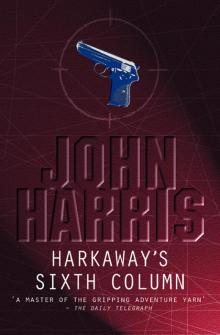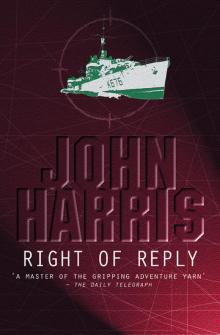- Home
- John Harris
The Lonely Voyage
The Lonely Voyage Read online
Copyright & Information
The Lonely Voyage
First published in 1951
© Juliet Harris; House of Stratus 1951-2012
All rights reserved. No part of this publication may be reproduced, stored in a retrieval system, or transmitted, in any form, or by any means (electronic, mechanical, photocopying, recording, or otherwise), without the prior permission of the publisher. Any person who does any unauthorised act in relation to this publication may be liable to criminal prosecution and civil claims for damages.
The right of John Harris to be identified as the author of this work has been asserted.
This edition published in 2012 by House of Stratus, an imprint of
Stratus Books Ltd., Lisandra House, Fore Street, Looe,
Cornwall, PL13 1AD, UK.
Typeset by House of Stratus.
A catalogue record for this book is available from the British Library and the Library of Congress.
EAN ISBN Edition
0755102185 9780755102181 Print
0755127471 9780755127474 Mobi/Kindle
0755127757 9780755127757 Epub
This is a fictional work and all characters are drawn from the author’s imagination.
Any resemblance or similarities to persons either living or dead are entirely coincidental.
www.houseofstratus.com
About the Author
John Harris, wrote under his own name and also the pen names of Mark Hebden and Max Hennessy.
He was born in 1916 and educated at Rotherham Grammar School before becoming a journalist on the staff of the local paper. A short period freelancing preceded World War II, during which he served as a corporal attached to the South African Air Force. Moving to the Sheffield Telegraph after the war, he also became known as an accomplished writer and cartoonist. Other ‘part time’ careers followed.
He started writing novels in 1951 and in 1953 had considerable success when his best-selling The Sea Shall Not Have Them was filmed. He went on to write many more war and modern adventure novels under his own name, and also some authoritative non-fiction, such as Dunkirk. Using the name Max Hennessy, he wrote some very accomplished historical fiction and as Mark Hebden, the ‘Chief Inspector’ Pel novels which feature a quirky Burgundian policeman.
Harris was a sailor, an airman, a journalist, a travel courier, a cartoonist and a history teacher, who also managed to squeeze in over eighty books. A master of war and crime fiction, his enduring novels are versatile and entertaining.
Book One
One
It was a cold place, that police-court, with the cold of an old man’s bones. There was a musty chill over the whole building, the chill of time, of tremendous age.
Shafts of dusty sunlight streamed through the brine-splashed windows and fell in square patches on the cold green paint opposite. A couple of banners and a ship’s crest nearby caught the splash of gold. High on the wall, over the magistrates’ bench, one of Nelson’s captains, whose name I can’t remember, stared bleakly over his nose from his gilt frame.
Down in the well of the court there was a gloom where the sun never reached. The stone floor was covered with strips of rush matting to deaden the sound of heels, and the oak of the furnishings was smeared where hundreds of fingers had gripped it during hundreds of petty sessions. In the public gallery, which was the dignified name given to the three or four raised benches at the back of the court, there was an uninterested group of spectators – a snuffle-nosed old man who’d come in for a rest as a change from the reading-room of the public library, I suspect; a hawk-nosed battleaxe in uniform who represented some women’s organisation, and a Salvation Army official complete with bus conductor’s cap and red sea-jersey.
There was a lot of whispering between the sergeant and the policeman on the door before we were shepherded inside. The chill of the place struck you as soon as you left the passage where the defendants and witnesses were waiting in whispering groups, apprehensive and afraid because they didn’t know what was coming. Only the old hands who’d been there before showed no nervousness and lounged outside in the fresh air, smoking and even chatting with the bobby on the steps.
At the other side of the heavy oak door, where we’d heard muffled voices for an hour past, the solicitors were collecting sheaves of papers or leaning across their table to whisper with their clerks. The police superintendent just below the magistrates’ high throne ran a podgy finger round the collar of his tunic, and made himself comfortable. Just above him, to his left, the Mayor and the other magistrates sat, bored and uninterested. It had been an unentertaining morning, full of paternity orders, dockside drunks and backyard squabbles. I’d been outside talking to them for an hour, so I knew.
The Mayor fiddled with his case-sheet as the door closed behind us, leaned his cheek on a fat hand and sighed out loud as he eased his behind.
“Call the next case,” the magistrates’ clerk said. He was a little chap, with a ferret-face and a neck as stringy as an old tomcat’s. His voice was like drawing a file across the corner of an anvil. The superintendent waited for a signal from him, then tugged down his well-filled tunic and stood up, rattling a sheet of paper.
“Your worships,” he said, and he seemed to be speaking to somebody in the next street, “one of the defendants in this case is a boy of fifteen. Normally, of course, he’d come before the juvenile court, but in the circumstances that exist it’s been decided to bring him before the bench today with the other two defendants.”
The magistrates concurred, nodding to the superintendent with about as much interest as if he’d been talking to himself, and he turned towards the well of the court again.
“Patrick Fee, Jess Ferigo, Horatio James Boxer,” he declaimed, reading from his charge-sheet.
The old man from the library stirred as we were pushed forward and manoeuvred by bored policemen into the dock, two youngsters and a great raw lurcher of a man in a shabby suit.
Old Boxer stood leaning on the rails, resting his weight on his hands. His hat was stuffed all-ways into his pocket, and he eyed the court with an air of defiance. He’d been handsome once, but the years and the rum that even there in the police-court betrayed its presence in his breath had left their mark on him. His grizzled hair still clustered in small curls above his ears, but his heavy figure was flabby and his face had a ravaged look about it. He seemed to me like some heroic ruin, some crumbling monument. There was the same sense of decaying grandeur about his craggy features.
He wore an air of false good humour that admitted a fair cop and didn’t give a damn about it, a suggestion of indifference that the look in his flickering eyes made into nonsense. He was trying to give himself Dutch courage by an act of contempt for everything that was taking place around him.
Pat Fee’s attitude had the same suggestion of carelessness, but his aged eyes showed none of Old Boxer’s uneasiness. He was a sharp customer of eighteen then, was Pat, who’d already got the shady tricks of half a dozen trades at his finger-tips, and there was a cocksure boldness in the tilt of his head that indicated self-confidence far more than Old Boxer’s studied calm.
I must have seemed a child by contrast with him.
While I waited for the fun to begin, I studied the pale face of the Mayor, whom I’d seen somewhere before wearing a red cloak and a fur Sunday-go-to-meeting hat. The magistrates’ clerk just below him was reading the charge against us and the plump red-faced police superintendent, who’d whispered outside to me that there was nothing to be afraid of, was waiting for him to finish, fidgeting with his papers as he leaned against the bench. Farther down the court was an array of bobbies, curiously human without their helmets, and, near them, my father, Dig Ferigo. He looked slight alongside the polic
emen, and shy and stooping, screwing at his hat with worried fingers. He was an accounts clerk at Wiggins’ boat-yard down by the river, where he worried into their proper places all the red and black figures that made everybody else but him go cross-eyed.
‘Is the boy’s father in court?” the magistrates’ clerk demanded suddenly, lifting his ferret-face from his papers, and as Dig half rose, embarrassed and unhappy, a solicitor jumped to his feet, energetic and efficient, as confident as Dig was self-conscious and unsure. Dig was paying him the best part of his savings for it, so he wasn’t doing it for fun.
“He is, your worships!”
“And what’s the plea?”
“May it please your worships, my client pleads not guilty.”
I gathered from this they were trying to make out I hadn’t been poaching when I was caught with Old Boxer and Pat. But that was nonsense, of course. I’d not only been poaching but I’d been the one who banged the life out of the furry body they found in Old Boxer’s pocket.
The superintendent broke into my thoughts as he began to read a summary of the evidence against us, and suddenly, so unexpectedly it made me jump, Old Boxer began to speak. His manner was aggressive as usual.
“Yes, I am Horatio Boxer,” he said. His tone indicated he wasn’t in the habit of answering questions about himself.
Ferret-face scowled at him. “Don’t be insolent,” he snapped venomously. “Do you plead guilty or not guilty?”
Old Boxer stared at him as though he were something unpleasant. “That’s for you to decide. You brought me here.”
Ferret-face went puce. He knew Old Boxer was taking the mike out of him. “Be quiet! Do you plead guilty or not guilty, Boxer,” he snapped, his voice sharp with anger. “You must know.”
But Old Boxer obviously intended to keep him waiting as long as possible. “I only know,” he said, “that all this is a lot of damn’ nonsense.” He spoke as though he were more used to giving orders than receiving them.
“If you don’t behave we’ll have you taken below,” the magistrates’ clerk almost shouted, looking as though he’d like to throw the inkwell at him. “Now, do you plead guilty or not guilty?”
“Pah, it was no bigger than a backyard rat!”
“You plead guilty,” Ferret-face snapped sourly and with an air of finality, and he signed hurriedly to the superintendent to carry on before there were any more interruptions.
I felt an elbow dig into my ribs and turned to see Pat Fee winking. There was nothing in Pat of his Ma, a prematurely old woman who kept a sailors’ lodging-house near the docks. But from his father, who was Irish, a greaser on a coasting freighter, he’d inherited a glib sauciness that made him indifferent to his position in the dock. He was a sly bit of goods, was Pat, sharper even than his father, and he’d no fears of the police-court. I envied him. He reckoned on more than holding his own.
“The old lady’s brought Katie’s new shoes with ’er,” he whispered, indicating his mother in the public gallery. “Bang they go to Levy’s pop-shop if there’s a fine.” He grinned and I felt vaguely ashamed at being concerned in any lark that might jeopardise anything that belonged to Katie Fee. She was a nice kid, serious and dark, and always friendly in a grave way that never let you pull her leg. She’d been waiting outside the police-court for her mother as I arrived, silent and preoccupied, apparently prepared to kill time to the last trump if necessary…
The case dragged wearily along, through all sorts of byways that didn’t seem to have anything to do with it at all. Questions kept popping out at me from nowhere and old Ferret-face kept getting mad at us. Old Boxer deliberately baited him, and was warned a couple of times for it by the Mayor.
“One more interruption from you, Boxer,” he was told sourly, “and we’ll put you away to cool your heels for a while. Perhaps you’d listen then to some of the things we’re trying to say to you.”
“God forbid,” Old Boxer murmured.
I don’t know whether the Mayor heard or not. I think he did, although he pretended not to and signed to Ferret-face to carry on. But Ferret-face was having a worse time of it than he was, and I reckon he’d just as soon have left it to the Mayor. Old Boxer was more than a match for him – even though he kept a wary eye on the Mayor and didn’t get into trouble again. But I could see he was fed up with the whole affair and was getting ready to throw his hand in.
He seemed to lose all interest in the arguing, and began to glower boldly at the old battleaxe from the women’s organisation in such an aggressive way that she blushed. Pat was counting the knobs of plaster that ran round the room high up near the ceiling. I did the same for a while, bored with the wordy wrestling, then I began to stare at the clouds that hurried past outside the windows, obscuring the sunny blue of the sky from time to time. The police-court was stuffy and smelt strongly of carbolic soap that seemed to stick, sharp and acid, in my throat. I was itching, and had been for half an hour, to be outside where the wind blew the spray over the blunt bows of the ferry on the river to St Clewes and across the shipping crowding the estuary.
I could see sparrows fighting and twittering in the eaves of the building opposite, and a few cold-eyed, yellow-beaked gulls goose-stepping along the lichen-covered roofs. Before you could say Jack Robinson I was out of the drab court-room and miles away where the sun glinted on the oil-slicked water of the river. I was never behind the door when they handed out the ability to daydream. I could see ships on pond-calm seas that shimmered in a brassy glare, and waving palm fronds and foreign ports with names that made your head ring – Pernambuco, Port o’ Spain, Singapore…
“Boy! Wake up, boy!”
An acid voice whirled in space, focused suddenly and stretched in a vast shout in front of me. I started and straightened up in a noisy shuffle.
“What’s the matter? Asleep or something?” Ferret-face was scowling at me as though he’d have liked to box my ears.
“No.” I was hardly able to make the word come from my stiff lips.
“Say ‘sir’,” the superintendent prompted.
“Sir,” I repeated dutifully.
“Then pay attention!” Ferret-face was wagging a pencil at me. “This is no place to go moonstruck, is it?”
“No.”
“Sir!’’
“Sir.”
“Now! Were you with Horatio Boxer and Patrick Fee on the day in question?”
As Ferret-face leaned forward suddenly and peered at me, I tried to make my clumsy thoughts function. I hadn’t heard half of what had gone before and I could see Pat grinning alongside me.
“Come now! Answer me quickly! Were you with the other defendants on the day in question?”
“I – I dunno,” I said. “What day was that?”
“Ach!” The magistrates’ clerk slammed a hand down on his ledger with a gesture of annoyance. “You haven’t been listening to a word that’s been said! Now, have you?”
“No, sir.” My guilt seemed enormous.
Up popped the solicitor from his bench, brisk as a jack-in-a-box. “May it please your worships, the boy’s probably frightened a little by his surroundings. After all, this isn’t a juvenile court.” He coughed deprecatingly and the Mayor nodded sympathetically.
The magistrates’ clerk took the hint, left me gratefully alone and rounded on Pat:
“Take that grin off your face! This is a court of law and a serious business!”
Pat’s face became an austere mask.
I tried hard to concentrate. I’d long ago admitted all my guilt in the affair to Dig, and all this performance seemed to have broken away from reality. I began to study the superintendent, deciding I’d be safe if I kept my eye on him. I was determined Ferret-face shouldn’t catch me again.
Then I noticed the superintendent didn’t seem to know what to do with his hands. First he poked out an ear and pulled at his long nose. Then he fiddled with his papers, shoved his hands in his pockets and sat quietly for a while. Eventually, however, I noticed in fasci
nation, his hands reappeared and he used them to stroke his hair, smooth the creases out of his tunic and ease his collar. I watched, spellbound, until finally he appeared to stare at his hands in distaste, as though wondering what to do next with them, and shoved them under his broad behind and sat on them to keep them still.
I fought hard against boredom. The superintendent helped a lot, but I gradually lost interest once more. All this arguing seemed unnecessary. I’d been through it all before with Dig.
The minutes slid by in unhurried monotony, with my mind anywhere but on the avalanche of words, then suddenly I realised the Mayor was speaking and started to attention.
“We shall bind the two younger defendants over for six months in five pounds,” he was saying. “We’ll deal with the defendant Boxer in a moment.”
I saw a stir in the public benches and caught a glimpse of Pat Fee’s mother half-rising to her feet, then a sharp “Pay attention” made me realise Ferret-face hadn’t missed anything. He still desired me inside the orbit of his ministrations.
He stood up on his raised dais and pointed a pencil at us, wagging it with every word he spoke.
“You are bound over in the sum of five pounds,” he said in a nasal monotonous voice, “to be of good behaviour for six months, and that you appear at this court for conviction and sentence if-called-upon-at-any-time-within-that-six-months.”
He seemed to lose interest towards the end and babbled the last few words in a meaningless jumble. A policeman with a fair moustache took my arm and piloted me gently from the dock. Then, as I moved towards Dig, I heard the superintendent reading out Old Boxer’s record, a lengthy recital of wrongdoing that seemed to feature drunkenness rather than criminality.
Old Boxer listened intently, almost as though he were anxious that none of his misdeeds should be omitted. He was deliberately making a farce of the proceedings with an attitude of studied carelessness that didn’t seem quite genuine.

 China Seas
China Seas The Mercenaries
The Mercenaries Road To The Coast
Road To The Coast The Thirty Days War
The Thirty Days War The Old Trade of Killing
The Old Trade of Killing Ride Out The Storm
Ride Out The Storm Corporal Cotton's Little War
Corporal Cotton's Little War Fox from His Lair
Fox from His Lair Paint The Rainbow
Paint The Rainbow Flawed Banner
Flawed Banner Covenant with Death
Covenant with Death So Far From God
So Far From God The Sea Shall Not Have Them
The Sea Shall Not Have Them The Cross of Lazzaro
The Cross of Lazzaro Smiling Willie and the Tiger
Smiling Willie and the Tiger Harkaway's Sixth Column
Harkaway's Sixth Column The Sleeping Mountain
The Sleeping Mountain The Claws of Mercy
The Claws of Mercy North Strike
North Strike Picture of Defeat
Picture of Defeat Army of Shadows
Army of Shadows Right of Reply
Right of Reply Getaway
Getaway The Lonely Voyage
The Lonely Voyage Take or Destroy!
Take or Destroy! The Backpacker
The Backpacker A Funny Place to Hold a War
A Funny Place to Hold a War Swordpoint (2011)
Swordpoint (2011) A Kind of Courage
A Kind of Courage